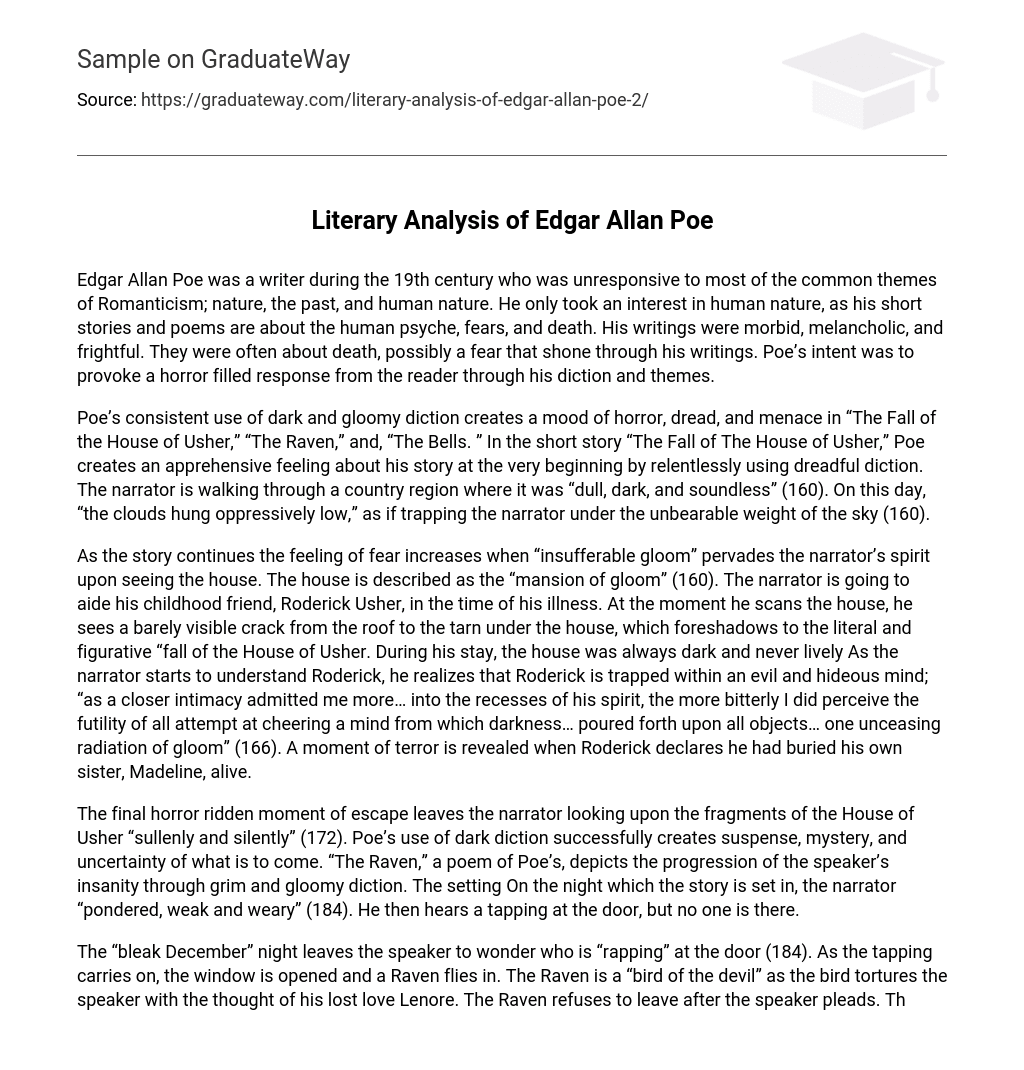Edgar Allan Poe was a writer during the 19th century who was unresponsive to most of the common themes of Romanticism; nature, the past, and human nature. He only took an interest in human nature, as his short stories and poems are about the human psyche, fears, and death. His writings were morbid, melancholic, and frightful. They were often about death, possibly a fear that shone through his writings. Poe’s intent was to provoke a horror filled response from the reader through his diction and themes.
Poe’s consistent use of dark and gloomy diction creates a mood of horror, dread, and menace in “The Fall of the House of Usher,” “The Raven,” and, “The Bells. ” In the short story “The Fall of The House of Usher,” Poe creates an apprehensive feeling about his story at the very beginning by relentlessly using dreadful diction. The narrator is walking through a country region where it was “dull, dark, and soundless” (160). On this day, “the clouds hung oppressively low,” as if trapping the narrator under the unbearable weight of the sky (160).
As the story continues the feeling of fear increases when “insufferable gloom” pervades the narrator’s spirit upon seeing the house. The house is described as the “mansion of gloom” (160). The narrator is going to aide his childhood friend, Roderick Usher, in the time of his illness. At the moment he scans the house, he sees a barely visible crack from the roof to the tarn under the house, which foreshadows to the literal and figurative “fall of the House of Usher. During his stay, the house was always dark and never lively As the narrator starts to understand Roderick, he realizes that Roderick is trapped within an evil and hideous mind; “as a closer intimacy admitted me more… into the recesses of his spirit, the more bitterly I did perceive the futility of all attempt at cheering a mind from which darkness… poured forth upon all objects… one unceasing radiation of gloom” (166). A moment of terror is revealed when Roderick declares he had buried his own sister, Madeline, alive.
The final horror ridden moment of escape leaves the narrator looking upon the fragments of the House of Usher “sullenly and silently” (172). Poe’s use of dark diction successfully creates suspense, mystery, and uncertainty of what is to come. “The Raven,” a poem of Poe’s, depicts the progression of the speaker’s insanity through grim and gloomy diction. The setting On the night which the story is set in, the narrator “pondered, weak and weary” (184). He then hears a tapping at the door, but no one is there.
The “bleak December” night leaves the speaker to wonder who is “rapping” at the door (184). As the tapping carries on, the window is opened and a Raven flies in. The Raven is a “bird of the devil” as the bird tortures the speaker with the thought of his lost love Lenore. The Raven refuses to leave after the speaker pleads. The speaker calls the bird “grim, ungainly, ghastly, gaunt, and ominous bird of yore” while sitting in front of the Raven (187). Then he states “and his eyes have all the seeming of a demon’s that is dreaming,” as if the Raven is an evil deity thinking above his doorstep. 188). Poe uses dark diction to describe the Raven as an omniscient bird, whose sole job is to bestow a weight upon the speaker. The poem ends with the bird replying “nevermore” (188). The Raven “never flitting, still is sitting, still is sitting on the pallid bust of Pallas just above my chamber door” (188). The end of the poem signifies that the speaker has gone insane. Poe uses mysterious and dark diction to explore the human mind in “The Raven. ” In Poe’s poem “The Bells,” word choice plays a part in the menacing mood.
In the first stanza, the words “tinkle” and “jingle” may seem merry, just like childhood, but there is a reference to “Runic rhyme,” or characters in an ancient alphabet that have a mystical significance(190). This reference links to the supernatural and to its powers. In the second stanza, which is connected to marriage, Poe uses the verse “how it tells of the rapture that impels,” to tell of the tragedy or even death that is bound to come (192). The third stanza is linked to a crisis using words such as “alarum,” “terror,” “turbulency,” “horrified,” and shriek” (192).
These words are full of fear and distress. The fourth stanza is associated with death and uses words such as “silent,” “melancholy,” “groaning and moaning,” “ghouls,” and “monody” (193). What once started out as a cheerful poem in the first stanza turned into a dreadful one when it finished. The dreadful mood will leave a dark and grim impression on the reader leaving the last line “To the moaning and the groaning of the bells” (193). Poe uses his constant dark diction to create an impression that will never be forgotten. Not just because it is so gloomy, but there is nothing else alike.
The horrific mood in all of his stories is formed by his gloomy diction, which is ever so relentless. Poe’s diction conveys themes of death and fear found through searching the human mind. The gloomy diction used in all of his works displays his themes, ideas, and interests. Through grotesque word choice, Poe paints a picture that is mysterious and dark in all of his works. The mood established by his unique diction displays unity, as it is fearsome as the words. Edgar Allan Poe uses continuous dark diction to leave a lasting mood of terror and menace in “The Fall of the House of Usher,” “The Raven,” and, “The Bells. ”





